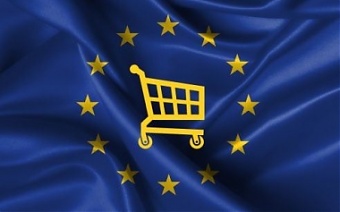Analytics, EU – Baltic States, Good for Business, Legislation, Markets and Companies, Modern EU
International Internet Magazine. Baltic States news & analytics
Wednesday, 17.12.2025, 03:27
Removing obstacles & reinforcing trust in the Single Market for SMEs and consumers
 Print version
Print version |
|---|
It
is known that trade in goods accounts for 75% of intra-EU trade and around 25%
of the EU's GDP. The ESM product rules cover vast majority of all manufactured
products in the EU with an average value of €2,400 billion; about 5 million SMEs
are involved in produced and/or distributing various goods.
The
EU Single Market (ESM) is designed to allow goods, services, capital and people
to move freely around the member states while offering greater choice and lower
prices for consumers and opportunities for professionals and businesses. However,
these opportunities do not always provide for the mentioned advantages as ESM’s
rules are either not known nor implemented or simply tarnished by numerous unjustified
barriers. Thus in 2015, the Commission presented its Single Market Strategy,
i.e. a roadmap to deliver on political commitment to unleash full potentials of
the Single Market by using ESM as a vital instrument for European companies’
growth.
See
more on ESM in: http://ec.europa.eu/growth/single-market/strategy_en
ESM
rules not only allow products to circulate freely among the EU states but ensure
high level of environmental, health and safety protection; e.g. EU legislation
in such areas as toys and chemicals are among
the strictest in the world.
The
new proposals complement other initiatives already put forward to deliver on
the 2015 Single Market Strategy: e.g. measures for
improved protection of intellectual property rights, proposals on
e-commerce, guidance on the
collaborative economy, steps to modernise the
EU's standardisation policy, a Start-up and Scale-up
Initiative, measures to give
a fresh boost to the services sector and steps to enhance
compliance and practical functioning of the EU Single Market.
Internal
Market Commissioner Elżbieta Bieńkowska underlined
commenting on the drafts’ publication, that consumers in the EU Single Market have to trust that the
products they use are of the same standard wherever they come from. Besides, public
authorities must believe that the products on their national markets are safe
for their citizens. She added that trust in the Single Market was undermined by
recent scandals; this trust must be rebuilt with stricter controls to exclude faulty
products from the market.
Main ideas of the proposals
New
Commission drafts are designed to improve two aspects of the free flow of
goods:
= First, making it
easier to sell products in another EU state.
The
“mutual recognition” principle (TFEU arts 114 and 294) ensures that products not subject to EU-wide
regulation can, in principle, move freely within the Single Market, if they are
lawfully marketed in one Member State. This principle should allow
manufacturers to sell their products across Europe without any additional
requirements. But this is not always working as it should. In practice,
companies wishing to sell products such as shoes, tableware or furniture in
another EU state often face barriers, delays and extra costs.
|
Commission proposes a
new Regulation on the Mutual Recognition
of Goods in order to make the principle faster, simpler and
clearer in practice; see drafts in: COM (2017)796 - Proposal for a
Regulation on the mutual recognition of goods lawfully marketed in another
Member State.
As well as the following documents: = |
|
COM (2017) 796 ANNEX - Annex
to the Proposal; = SWD (2017)471 - Impact assessment;
= SWD (2017)472 - Executive summary of
the impact assessment; SWD (2017)475 - REFIT evaluation;
and = SWD (2017)476 - Executive summary of
the REFIT evaluation. |
After Regulation’s adoption, companies will know if their products can be sold in another EU country and be able to use a voluntary declaration to demonstrate that their products meet all the relevant requirements in their country. This will make it easier for authorities of other EU states to assess whether or not mutual recognition should apply. Similarly, a problem resolution mechanism will allow for a faster resolution of disputes between companies and national authorities. Training and exchanges among officials will further improve collaboration and trust among national authority, this would not prevent national authorities from taking other legitimate public policy concerns. |
| = Second, strengthening national authorities’ controls to ensure that products are safe and comply with the existing rules. |
This
endangers consumers and puts compliant businesses at a competitive
disadvantage. The draft Regulation on Compliance and
Enforcement will help create a fairer internal market for
goods, through fostering more cooperation among national market surveillance
authorities.
This
draft includes option of sharing information about illegal products and ongoing
investigations so that authorities can take effective action against
non-compliant products.
The
draft would also help national authorities improve checks on products entering
the EU market. Since 30% of goods in the EU are imported, the Commission
further proposes to reinforce inspections of ports and external borders.
Two
Regulations’ drafts have to be adopted by the European Parliament and the Council;
then, they will be directly applicable in the member states.
More information on: = Frequently Asked
Questions; = Factsheet –
Single Market: trading goods across Europe; = Stockshots –
Single Market; = Proposal for a Regulation on the
Mutual Recognition of Goods; = Proposal for a Regulation on
Compliance and Enforcement
Communication: The Goods Package:
Reinforcing trust in the single market; = Report on the operation of the Single
Market Transparency Directive (Directive 2015/1535); = Report on accreditation
Source: Commission press
release “Safe products in the EU single market: Commission acts to reinforce
trust”, Brussels, 19 December 2017, in:
http://europa.eu/rapid/press-release_IP-17-5301_en.htm;
Latvian version in: http://europa.eu/rapid/press-release_IP-17-5301_lv.htm;
Lithuanian version in: http://europa.eu/rapid/press-release_IP-17-5301_lt.htm; and
Estonian version in: http://europa.eu/rapid/press-release_IP-17-5301_et.htm.








 «The Baltic Course» Is Sold and Stays in Business!
«The Baltic Course» Is Sold and Stays in Business!

